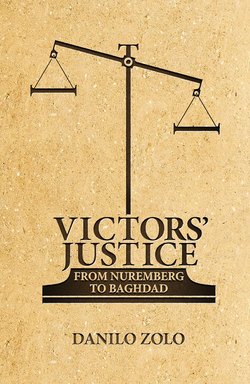Victors’ Justice

Реклама. ООО «ЛитРес», ИНН: 7719571260.
Оглавление
Danilo Zolo. Victors’ Justice
VICTORS’ JUSTICE
VICTORS’ JUSTICE
Отрывок из книги
From Nuremberg to Baghdad
DANILO ZOLO
.....
It was this sort of legal internationalism, albeit in a very different form to that contemplated by Kelsen, which guided the victors—the United States, the Soviet Union, Britain and France—in instituting the Nuremberg International Military Tribunal. Agreement was reached in London on 8 August 1945, just two days after the atomic bomb was dropped on Hiroshima, and two days before the bombing of Nagasaki. The Tribunal held its opening session in November 1945, and hearings continued until October 1946. Of the twenty-two accused, three were cleared, six were convicted and given life imprisonment or shorter prison sentences, and ten were given the death sentence, which was carried out immediately. For the first time in the history of humankind, a war of aggression was considered not as a generic breach of international law involving the liability of the state qua state, but as an authentic ‘international crime’ for which individuals too were held penally responsible. Article 6(a) of the Tribunal’s Statute gave an explicit definition of ‘crimes against peace’, placing them under the jurisdiction of the court alongside ‘war crimes’ and ‘crimes against humanity’. They consisted in actions such as ‘planning, preparation, initiation, or waging of a war of aggression, or a war in violation of international treaties, agreements, or assurances, or participation in a common plan or conspiracy for the accomplishment of any of the foregoing’.55 Robert Jackson, chief US prosecutor to the Nuremberg Tribunal, had this to say in his opening speech to the court:
Any resort to war—to any kind of a war—is a resort to means that are inherently criminal. War inevitably is a course of killings, assaults, deprivations of liberty, and destruction of property. An honestly defensive war is, of course, legal and saves those lawfully conducting it from criminality. But inherently criminal acts cannot be defended by showing that those who committed them were engaged in a war, when war itself is illegal. The very minimum legal consequence of the treaties making aggressive wars illegal is to strip those who incite or wage them of every defense the law ever gave, and to leave war-makers subject to judgment by the usually accepted principles of the law of crime.56
.....